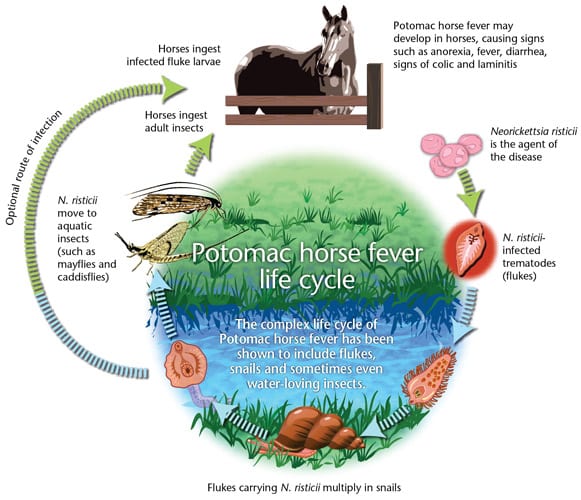With summer just around the corner, now is the time to vaccinate horses against Potomac horse fever (PHF).
“Horse owners need to be aware of the disease and its seasonality,” says Dr. Julia Wilson, DVM, associate professor, large animal medicine, University of Minnesota.
PHF is a potentially deadly disease that can cause mild depression, anorexia, diarrhea1 and abortion in pregnant mares.2 Some horses also may develop severe toxemia, and up to 40 percent of horses with PHF will develop laminitis.2
PHF is caused by aquatic insects, such as caddisflies and mayflies1 that are infected with the agent of disease, Neorickettsia risticii, and is traditionally seen in the summer and early fall2 during the insects’ peak hatching times.1 Horses can ingest infected aquatic insects while grazing near waterways.1
Caddisflies, mayflies and other carriers also swarm around barn lights, causing infection even while horses are stabled.1 “Insects like to swarm around lights,” says Dr. Frank Hurtig, DVM, MBA, director, Veterinary Services, Merial. “That’s why it’s so important to keep hay and water away from lights that stay on all night. Once those infected insects die, they may fall directly into the horse’s food and water source.”
Traditionally seen in areas surrounding freshwater streams and other bodies of water,1 PHF has been found in nontraditional areas, including northern Wyoming3 and Minnesota.4 In fact, PHF has been known to occur in 43 states, three Canadian provinces, and parts of South America, The Netherlands, France and India.1
“PHF boundaries are very blurry,” Dr. Hurtig says. “Horse owners should consider their proximity to bodies of water, their travel plans for the summer, and most importantly, consult their veterinarian about vaccinating for PHF.”
Dr. Hurtig advises horse owners to talk with their veterinarians about a vaccine that is proven safe and effective, like Equine POTOMAVAC™ from Merial. In one study, POTOMAVAC protected 86 percent of horses from clinical disease.5 It also is proven safe for horses as young as 3 months6 and is available as a combination of Equine POTOMAVAC + IMRAB® to help protect against both PHF and rabies.
Merial is a world-leading, innovation-driven animal health company, providing a comprehensive range of products to enhance the health, well-being and performance of a wide range of animals. Merial employs approximately 5,400 people and operates in more than 150 countries worldwide. Its 2008 sales were over $2.6 billion. Merial Limited is a joint venture between Merck & Co., Inc. and sanofi-aventis. For more information, please see www.merial.com.
®IMRAB is a registered trademark, and ™POTOMAVAC is a trademark, of Merial. ?2009 Merial Limited. Duluth, GA. All rights reserved. LAGEBPM811 (07/08)
1Pusterla N and Madigan JE. Neorickettsia risticii. In: Sellon DC and Long MT, ed. Emerging Infectious Diseases. St. Louis, Mo.: Saunders; 2007:357-362.
2Merck Veterinary Manual. Ninth edition. 2005:236-237.
3Hamende V. Potomac horse fever confirmed in northern Wyoming. University of Wyoming Cooperative Extension Service. Press release, Sept. 13, 2002. Available at: http://wyovet.uwyo.edu/Diseases/2002/PotomacConf.pdf. Accessed July 16, 2008.
4Wilson JH, Pusterla N, et al. Incrimination of mayflies as a vector of Potomac horse fever in an outbreak in Minnesota. AAEP Proceedings 2006;52:324.
5Merial Trial ER 8-88-2.
6POTOMAVAC product label.








